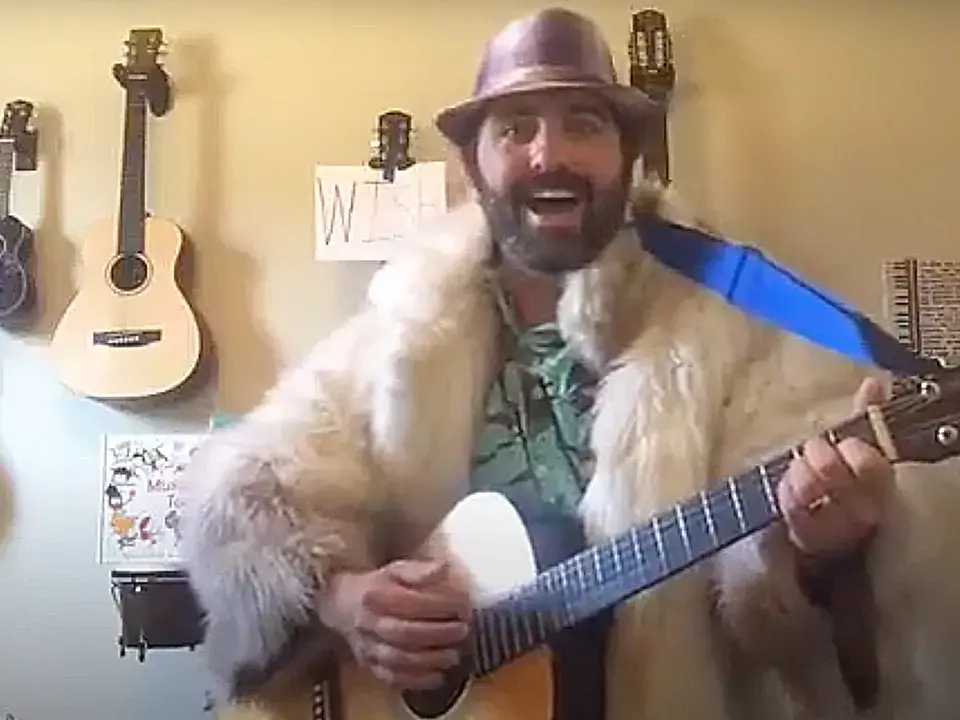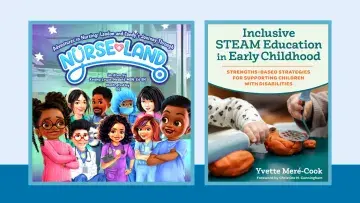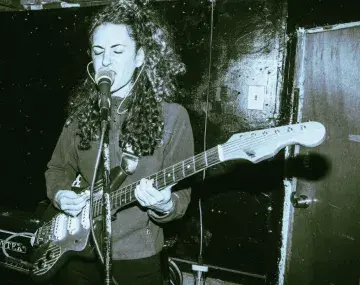OTD Alumnus Spreads Joy in Time of COVID-19
Whether donning a pink wig and feather boa or playing guitar while he sings into a banana microphone, Dave Pilon, ODT ’12, is spreading joy and love in the time of COVID-19 to kids and families. His Facebook Live show, “Days with Dave,” features songs, games, experiments, and some serious silliness.
What was your inspiration for "Days with Dave?"
I’m an occupational therapist working in pediatrics. Like everyone around us, my world shifted in March. I started doing teletherapy at an outpatient clinic every other day. I have kids and nephews and nieces and started looking at ways to entertain them. There’s so much stress right now. I’m worried about our mental health. Through mediums like “Days with Dave,” I hope we can elicit joy and have fun.
What role did COVID play in developing "Days with Dave?"
I’d been thinking about doing “Days with Dave” for a while but never had the time to commit to it. If COVID hadn’t happened, I probably wouldn’t have done it. I would have just kept pushing it off. For me, there’s a lot of growth that can come out of these trying times.
How has being a parent of a 3-year-old and 5-year-old influenced "Days with Dave?"
I see the things my kids watch. As a healthcare provider and educator, I have to ask, is this what you’re watching—a car running over toys in slow motion with 20 million views? As a dad, I said, I have to start doing something better than this! I feel blessed to have this medium where I can connect with so many people.
What does the future hold for “Days with Dave?”
I’ve heard from parents across the country who support what “Days with Dave” is doing and want more. I’d like to offer short, educational tips to both other occupational therapists and parents and start doing 5- to 10-minute video series singing a song, doing an experiment, maybe teaching a word-of-the-day.
You sing a lot on “Days with Dave.” What role does music play in your life?
Music has always been around my whole life. My dad’s not too good with a hammer, but he’s great at tuning a guitar. I’m always playing music with my own kids—in the mornings, when I come home, at bath time.
Did you have any personal experiences that influenced your decision to choose occupational therapy?
My aunt has developmental delay and was institutionalized at the beginning of her life, at a time when this is what we did with individuals with special needs. She’s now 65 and completely changed once she went from the institution to the community. She has transformed as a human being. I wonder what it would have been like if she had OT services throughout her life. She really inspired me to think more and more about community integration and occupational therapists’ vital role in helping an individual be part of a community.
When you think about SMU, what immediately comes to mind?
I felt inspired from the moment I set foot at Samuel Merritt. We spent a lot of time learning how to help individuals adapt tasks while paying mind to what motivates them, looking at that whole person. When there is a deficit that impacts a person’s functioning, whether it’s physical and/or cognitive, OTs have extensive training on analyzing activities. In doing so, we can better assist at task adaptation—cooking, dressing, driving, etc. OTs have that underlying knowledge on how performance impacts function, thus allowing us to be experts on task adaptation. I’m excited about that! I’m grateful to Samuel Merritt’s occupational therapy program for all the experiences I’ve had!
What role did SMU play in your desire to do community outreach?
One thing that Samuel Merritt was amazing at was that community piece in our cohort promoting us to work together for the greater good in Oakland, San Francisco, or wherever we were for our field sites. It felt like everyone wanted to promote health and wellness, and seeing our professors take their skill set and do good in the community is priceless.
How did SMU prepare you as a practitioner in this field?
At Samuel Merritt, I learned about individuals with autism and central-processing difficulties and how they have issues interpreting stimuli, specifically, auditory. You learn more how to implement therapies once you are in the field.
Who were your mentors and/or role models at SMU?
I’ve been in the field over a decade now and still run into Samuel Merritt professors who inspired me at conferences. Dr. Chi-Kwan Shea is one. She works with an occupational-therapy training program in San Francisco with a lot of at-risk youth who age out of the system. I feel like we need to be working with that population more.



